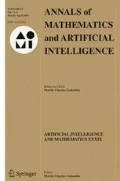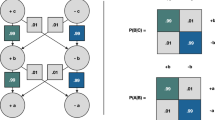Abstract
In this paper, we establish a formal semantics for Pollock’s [23] theory of defeasible reasoning. As a notion of argument or argumentation has never been formalised in this theory, it is important that such a formal account be introduced to couple with the algorithmic description of the theory. In particular, it makes Pollock’s theory become more comparable to other related frameworks as shown in the paper. In also enforces a well-defined semantical account for Pollock’s theory of defeasible reasoning based on the argumentation-theoretic approach proposed by Dung and Bondarenko et al. [1,5]. Our formalisation thus enables further studies to the meta-theoretic properties of Pollock’s defeasible reasoning system.
Similar content being viewed by others
References
A. Bondarenko, P.M. Dung, R.A. Kowalski and F. Toni, An abstract, argumentation-theoretic approach to default reasoning, Artificial Intelligence Journal 93 (1997) 63–101.
C.I. Chesñevar, A.G. Maguitman and R.P. Loui, Logical models of argument, ACM Computing Surveys (CSUR) 32(4) (2000) 337–383.
Y. Dimopoulos, B. Nebel and F. Toni, Preferred arguments are harder to compute than stable extensions, in: International Joint Conference on Artificial Intelligence, Stockholm, Sweden (1999) pp. 36–43.
J. Doyle, A truth maintenance system, Artificial Intelligence Journal 12(3) (1979) 231–272.
P.M. Dung, The acceptability of arguments and its fundamental role in nonmonotonic reasoning, logic programming and n-person games, Artificial Intelligence Journal 77 (1995) 321–357.
P.M. Dung, An argumentation-theoretic foundations for logic programming, Journal of Logic Programming 22(2) (1995) 151–171.
P.M. Dung and T.C. Son, An argument-based approach to reasoning with specificity, Artificial Intelligence Journal 133(1–2) (2001) 35–85.
D. Gabbay, C. Hogger and J. Robinson (eds.), Nonmonotonic Reasoning and Uncertain Reasoning, Handbook of Logic in Artificial Intelligence and Logic Programming, Vol. 3 (Oxford University Press, Oxford, 1994).
M. Gelfond and V. Lifschitz, The stable model semantics for logic programming, in: Proceedings of the Fifth International Conference and Symposium on Logic Programming (1988) pp. 1070–1080.
M. Ginsberg (ed.), Readings in Nonmonotonic Reasoning (Morgan Kauffman, Los Altos, CA, 1987).
J.F. Horty, Some direct theories of nonmonotonic inheritance, in: Nonmonotonic Reasoning and Uncertain Reasoning, eds. D. Gabbay, C. Hogger and J. Robinson, Handbook of Logic in Artificial Intelligence and Logic Programming, Vol. 3 (Oxford University Press, Oxford, 1994) pp. 111–187.
K. Konolige, On the relation between default theories and autoepistemic logic, in: International Joint Conference on Artificial Intelligence (1987) pp. 394–400.
F. Lin and Y. Shoham, Argument systems: A uniform basis for nonmonotonic reasoning, in: Principles of Knowledge Representation and Reasoning, Toronto, Canada (1989) pp. 245–255.
R. Loui, Defeat among arguments: a system of defeasible inference, Journal of Computational Intelligence 2 (1987) 100–106.
J. McCarthy, Circumscription – a form of nonmonotonic reasoning, Artificial Intelligence Journal 13(1–2) (1980) 27–39.
J. McCarthy, Applications of circumscription to formalizing common sense knowledge, Artificial Intelligence Journal 26(3) (1986) 89–116.
D.V. McDermott and J. Doyle, Non-monotonic logic I, Artificial Intelligence Journal 13(12) (1980) 41–72.
R.C. Moore, Semantical considerations on nonmonotonic logic, Artificial Intelligence Journal 25(1) (1985) 75–94.
D.N. Nute, Defeasible logic, in: Nonmonotonic Reasoning and Uncertain Reasoning, eds. D.M. Gabbay, C.G. Hogger and J.A. Robinson, Handbook of Logic in Artificial Intelligence and Logic Programming, Vol. 3 (Oxford University Press, Oxford, 1994).
J. Pollock, Knowledge and Justification (Princeton University Press, Princeton, 1974).
J. Pollock, Defeasible reasoning, Cognitive Science 11 (1987) 481–518.
J. Pollock, Justification and defeat, Artificial Intelligence Journal 67 (1994) 377–408.
J. Pollock, Cognitive Carpentry: A Blueprint for How to Build a Person (MIT Press, London, 1995).
J. Pollock, Defeasible reasoning with variable degrees of justification, Artificial Intelligence Journal 133(1–2) (2001) 233–282.
D. Poole, A logical framework for default reasoning, Artificial Intelligence Journal 36(1) (1988) 27–47.
H. Prakken and G. Sartor, A dialectical model of assessing conflicting arguments in legal reasoning, Artificial Intelligence and Law 4(3–4) (1996) 331–368.
H. Prakken and G. Sartor, Argument-based extended logic programming with defeasible priorities, Journal of Applied Non-Classical Logics 7 (1997) 25–75.
H. Prakken and G. Vreeswijk, Logics for defeasible argumentation, in: Handbook of Philosophical Logic, 2nd edition, Vol. 5, eds. D. Gabbay and F. Guenther (Kluwer Academic Publishers, Dordrecht, 2001).
R. Reiter, A logic for default reasoning, Artificial Intelligence Journal 13 (1980) 81–132.
G.R. Simari and R.P. Loui, A mathematical treatment of defeasible reasoning and its implementation, Artificial Intelligence Journal 53(2–3) (1992) 125–157.
Q.B. Vo, Meta-constructs and their roles in common sense reasoning, PhD thesis, School of Computer Science and Engineering, University of New South Wales (2002).
Q.B. Vo and N.Y. Foo, Solving the qualification problem, in: Australian Joint Conference on Artificial Intelligence (2001) pp. 519–531.
Q.B. Vo and N.Y. Foo, Solving the ramification problem: Causal propagation in an argumentation-theoretic approach, in: 7th Pacific Rim International Conference on Artificial Intelligence – PRICAI2002 (2002) pp. 49–59.
Q.B. Vo and J. Thurbon, Semantics for Pollock’s defeasible reasoning, in: Australian Joint Conference on Artificial Intelligence (1999) pp. 316–327.
G.A.W. Vreeswijk, Studies in deafeasible argumentation, PhD thesis, Department of Computer Science, Free University of Amsterdam (1993).
G.A.W. Vreeswijk, Abstract argumentation systems, Artificial Intelligence Journal 90 (1997) 225–279.
Author information
Authors and Affiliations
Corresponding author
Additional information
AMS (MOS) classification
68T30, 68T27
Part of the work presented in this paper has appeared in [34].
This work was performed while the first and the third authors were at the School of Computer Science and Engineering, University of New South Wales.
Quoc Bao Vo: Supported by the Dialog project, Collaborative Research Centre on Resource-adaptive cognitive processes (DFG-SFB378).
Rights and permissions
About this article
Cite this article
Vo, Q.B., Foo, N.Y. & Thurbon, J. Semantics for a theory of defeasible reasoning. Ann Math Artif Intell 44, 87–119 (2005). https://doi.org/10.1007/s10472-005-1807-4
Issue Date:
DOI: https://doi.org/10.1007/s10472-005-1807-4



